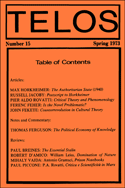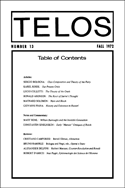By Jack Robert Edmunds-Coopey · Thursday, October 18, 2018 As an occasional feature on TELOSscope, we highlight a past Telos article whose critical insights continue to illuminate our thinking and challenge our assumptions. Today, Jack Robert Edmunds-Coopey looks at Herbert Marcuse’s “Contributions to a Phenomenology of Historical Materialism” from Telos 4 (Fall 1969).
Herbert Marcuse’s “Contributions to a Phenomenology of Historical Materialism” (1928) continues his efforts at fusing a contemporary form of Marxism with the work of his doctoral supervisor Martin Heidegger and his phenomenological project in Sein und Zeit (1927). The central tenet that Marcuse uses to construct a thread between Marxism and phenomenology is the analysis of the concrete and the correctness of knowledge as a truth related to this concreteness. The significance of Marxism as a theory of analysis is its self-reflexivity, the means by which it reflects on the process of historicity itself and, in addition to this, the processes of becoming that it undergoes as a result of its historical analysis. The difference here is that phenomenology claims to investigate the essences of things but does not concern itself with its own method or with a dialectical approach between the abstract and concrete, which inevitably occur as one attempts to capture a representation of an object.
Continue reading →
By Michael Marder · Friday, June 16, 2017 Critique of phenomenology amounts to a tiny piece of the puzzle that is Gianni Vattimo and Santiago Zabala’s thought-provoking Hermeneutic Communism: From Heidegger to Marx. According to the spot allocated to it, phenomenology fits in with the other manifestations of classical metaphysics, bent on preserving the transcendental privilege of immutable truth. In what follows, I will argue that such placement may not do justice to phenomenology, which, in its most critical manifestations, is an ally of hermeneutic communism. This particular piece of the puzzle belongs on the other side of the intellectual and historical barricades, and, more importantly, holds the potential for mediating between the various opposed camps—description and interpretation, realism and anti-realism, the strong and the weak, metaphysics and postmetaphysics—that Vattimo and Zabala keep apart.
Continue reading →
By Damien Booth · Tuesday, January 8, 2013 As an occasional feature on TELOSscope, we highlight a past Telos article whose critical insights continue to illuminate our thinking and challenge our assumptions. Today, Damien Booth looks at Pier Aldo Rovatti’s “Critical Theory and Phenomenology,” from Telos 15 (Spring 1973).
 The relationship between phenomenology and critical theory is a complex one that deserves a great deal of attention. On the one hand, Marcuse, as a student of Heidegger, maintained a certain level of affiliation with his thought, while, on the other, Lukács and Adorno were critical of phenomenology, with Heidegger in particular coming under criticism. In “Critical Theory and Phenomenology,” Pier Aldo Rovatti attempts to show how these two modes of thought may have a meaningful encounter. The relationship between phenomenology and critical theory is a complex one that deserves a great deal of attention. On the one hand, Marcuse, as a student of Heidegger, maintained a certain level of affiliation with his thought, while, on the other, Lukács and Adorno were critical of phenomenology, with Heidegger in particular coming under criticism. In “Critical Theory and Phenomenology,” Pier Aldo Rovatti attempts to show how these two modes of thought may have a meaningful encounter.
Continue reading →
By Damien Booth · Tuesday, October 16, 2012 As an occasional feature on TELOSscope, we highlight a past Telos article whose critical insights continue to illuminate our thinking and challenge our assumptions. Today, Damien Booth looks at Ronald Aronson’s “Interpreting Husserl and Heidegger: The Root of Sartre’s Thought” from Telos 13 (Fall 1972).
 Readers familiar with Jean-Paul Sartre’s philosophical writings understand that he inherited a great deal of his conceptual language from the phenomenological projects of Edmund Husserl and Martin Heidegger. In “Interpreting Husserl and Heidegger: The Root of Sartre’s Thought,” Ronald Aronson strips away much of the mystery from Sartre’s concepts and, in so doing, reveals something about the framework that Sartre inherits that may well restrict his philosophical project from the very start. The accusation Aronson levies against Sartre is that he opens up a gap between consciousness and the world, a gap that Husserl wished to close by developing his transcendental phenomenological method. Essentially, Aronson thinks that Sartre abandons the very developments that made Husserl’s and Heidegger’s projects tenable in the first place: “we find [Sartre] erasing all the structures of consciousness (emotional, cognitive, and social) which make the world intelligible and making consciousness into a ‘nothing'” (47). As a result, Sartre becomes tangled up in his “own conceptual apparatus.” To find out why he gets so conceptually confused by these entanglements, Aronson traces Sartre’s key concepts back to their roots in Husserl’s cognitive projects and Heidegger’s hermeneutic phenomenology. Readers familiar with Jean-Paul Sartre’s philosophical writings understand that he inherited a great deal of his conceptual language from the phenomenological projects of Edmund Husserl and Martin Heidegger. In “Interpreting Husserl and Heidegger: The Root of Sartre’s Thought,” Ronald Aronson strips away much of the mystery from Sartre’s concepts and, in so doing, reveals something about the framework that Sartre inherits that may well restrict his philosophical project from the very start. The accusation Aronson levies against Sartre is that he opens up a gap between consciousness and the world, a gap that Husserl wished to close by developing his transcendental phenomenological method. Essentially, Aronson thinks that Sartre abandons the very developments that made Husserl’s and Heidegger’s projects tenable in the first place: “we find [Sartre] erasing all the structures of consciousness (emotional, cognitive, and social) which make the world intelligible and making consciousness into a ‘nothing'” (47). As a result, Sartre becomes tangled up in his “own conceptual apparatus.” To find out why he gets so conceptually confused by these entanglements, Aronson traces Sartre’s key concepts back to their roots in Husserl’s cognitive projects and Heidegger’s hermeneutic phenomenology.
Continue reading →
|
|
 The relationship between phenomenology and critical theory is a complex one that deserves a great deal of attention. On the one hand, Marcuse, as a student of Heidegger, maintained a certain level of affiliation with his thought, while, on the other, Lukács and Adorno were critical of phenomenology, with Heidegger in particular coming under criticism. In “Critical Theory and Phenomenology,” Pier Aldo Rovatti attempts to show how these two modes of thought may have a meaningful encounter.
The relationship between phenomenology and critical theory is a complex one that deserves a great deal of attention. On the one hand, Marcuse, as a student of Heidegger, maintained a certain level of affiliation with his thought, while, on the other, Lukács and Adorno were critical of phenomenology, with Heidegger in particular coming under criticism. In “Critical Theory and Phenomenology,” Pier Aldo Rovatti attempts to show how these two modes of thought may have a meaningful encounter.  Readers familiar with Jean-Paul Sartre’s philosophical writings understand that he inherited a great deal of his conceptual language from the phenomenological projects of Edmund Husserl and Martin Heidegger. In “Interpreting Husserl and Heidegger: The Root of Sartre’s Thought,” Ronald Aronson strips away much of the mystery from Sartre’s concepts and, in so doing, reveals something about the framework that Sartre inherits that may well restrict his philosophical project from the very start. The accusation Aronson levies against Sartre is that he opens up a gap between consciousness and the world, a gap that Husserl wished to close by developing his transcendental phenomenological method. Essentially, Aronson thinks that Sartre abandons the very developments that made Husserl’s and Heidegger’s projects tenable in the first place: “we find [Sartre] erasing all the structures of consciousness (emotional, cognitive, and social) which make the world intelligible and making consciousness into a ‘nothing'” (47). As a result, Sartre becomes tangled up in his “own conceptual apparatus.” To find out why he gets so conceptually confused by these entanglements, Aronson traces Sartre’s key concepts back to their roots in Husserl’s cognitive projects and Heidegger’s hermeneutic phenomenology.
Readers familiar with Jean-Paul Sartre’s philosophical writings understand that he inherited a great deal of his conceptual language from the phenomenological projects of Edmund Husserl and Martin Heidegger. In “Interpreting Husserl and Heidegger: The Root of Sartre’s Thought,” Ronald Aronson strips away much of the mystery from Sartre’s concepts and, in so doing, reveals something about the framework that Sartre inherits that may well restrict his philosophical project from the very start. The accusation Aronson levies against Sartre is that he opens up a gap between consciousness and the world, a gap that Husserl wished to close by developing his transcendental phenomenological method. Essentially, Aronson thinks that Sartre abandons the very developments that made Husserl’s and Heidegger’s projects tenable in the first place: “we find [Sartre] erasing all the structures of consciousness (emotional, cognitive, and social) which make the world intelligible and making consciousness into a ‘nothing'” (47). As a result, Sartre becomes tangled up in his “own conceptual apparatus.” To find out why he gets so conceptually confused by these entanglements, Aronson traces Sartre’s key concepts back to their roots in Husserl’s cognitive projects and Heidegger’s hermeneutic phenomenology. 






